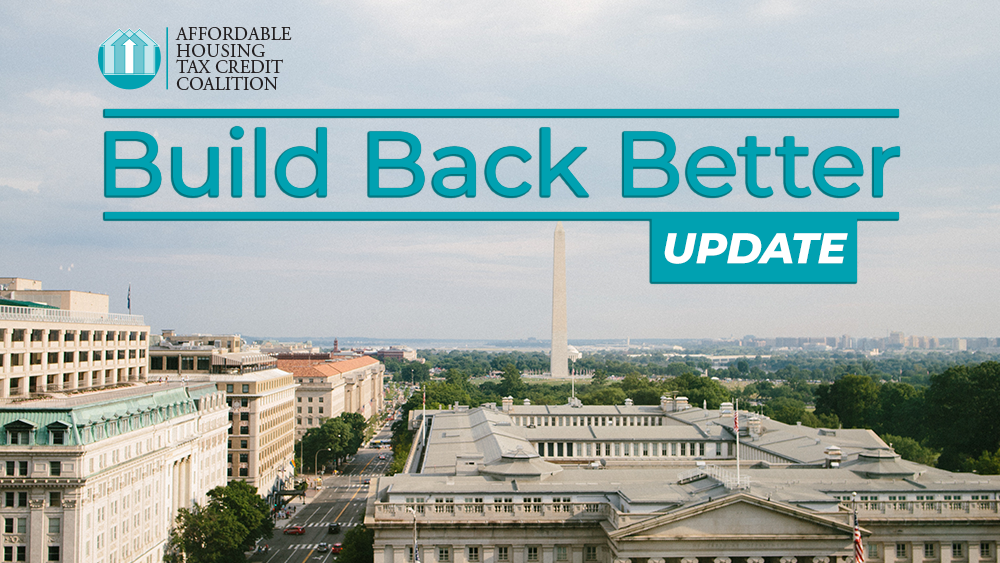Today the Biden Administration released more details on its American Jobs Plan, calling for an expansion of the Low-Income Housing Tax Credit (Housing Credit).
The $2.25 trillion American Jobs Plan infrastructure outline released last week proposed substantial investments in affordable housing and “targeted tax credits” to promote affordable housing development. The subsequent Treasury Department report released today, the “Made in America Tax Plan,” details the Administration’s tax proposals, specifically calling for “a marked increase in the resources available through the Low-Income Housing Tax Credit and other housing incentives.”
The American Jobs Plan
The fact sheet on the American Jobs Plan proposed major investments in housing, including:
- Building, preserving or retrofitting more than two million affordable and energy-efficient homes with an investment of $213 billion, including one million affordable units through “targeted tax credits, formula funding, grants, and project-based rental assistance,”
- Enacting the Neighborhood Homes Investment Act to build and rehabilitate more than 500,000 homes for low- and middle-income homebuyers,
- Eliminating exclusionary zoning and harmful land use policies, and providing grants to incentivize these steps,
- Providing $40 billion to revitalize public housing, and
- Providing funding for energy efficient upgrades in homes through block grants programs, the Weatherization Assistance Program, and home and commercial efficiency tax credits, as well as a $27 billion clean energy fund.
There are also a number of other proposals that could impact affordable housing, including:
- Increasing the Corporate Tax Rate: As one of the major ways to offset the cost of the plan over 15 years, the White House has proposed increasing the corporate tax rate from 21 to 28 percent. This proposal significantly diminishes any potential Republican support, and even some Democrats, including Sen. Joe Manchin (D-WV), who have said that a 28 percent rate may be too high and are instead urging consideration of a 25 percent rate.
- Replacing the Base Erosion and Anti-Abuse Tax (BEAT): The Made in America Tax Plan calls for replacing the BEAT with a new SHIELD tax (Stopping Harmful Inversions and Ending Low-tax Developments), which would deny multinational corporations U.S. tax deductions by reference to payments made to related parties that are subject to a low effective rate of tax. The current BEAT does not take into account the full value of the Housing Credit, and would eliminate the credit value beginning in 2026. The SHIELD proposal does not yet specify how credits will be accounted.
- Setting a Minimum Book Tax that Allows Credit for Affordable Housing Investments: The Made in America Tax Plan also calls for a 15 percent minimum book tax for large corporations that report high profits to stakeholders, though “firms would be given credit for taxes paid above the minimum book tax threshold in prior years, for general business tax credits (including R&D, clean energy and housing tax credits), and for foreign tax credits.”
- Requiring Prevailing Wages: The housing section of the American Jobs Plan fact sheet states that these proposals would “create jobs that pay prevailing wages, including through project labor agreements with a free and fair choice to join a union and bargain collectively.”
This $2.25 trillion plan is expected to be combined with a “human infrastructure” plan focused on social welfare for an estimated total of $4 trillion. Additional details are expected to be released in the next several weeks.
Potential Legislative Path
Though the Biden Administration and congressional leadership have said they will make an effort to make the infrastructure process bipartisan, they have also signaled they will move ahead without Republican support through budget reconciliation if needed – which is a likely path forward for much of the proposal, particularly if tax increases are used to offset the costs of the plan.
This week Senate Majority Leader Chuck Schumer (D-NY) reported that the Senate Parliamentarian made a very significant ruling that revisions could be made (by September 30 of this year) to the budget resolution for fiscal year (FY) 2021 to carry additional reconciliation instructions. This could allow Democrats two more opportunities to use the budget reconciliation process to bypass the filibuster and pass legislation in the Senate with 50 votes instead of 60 this year– at least one by revising the FY 2021 budget resolution and a second with the FY 2022 budget resolution– which could change the dynamics of how infrastructure legislation advances. Majority Leader Schumer said in a statement that “no decisions have been made on a legislative path forward… and some parameters need to be worked out,” but that it is “an important step forward that this key pathway is available to Democrats if needed.”
It is also possible some bipartisan elements of an infrastructure plan could advance through regular order (requiring bipartisan support to reach 60 votes in the Senate) while the rest moves through reconciliation. Many major components of an infrastructure package, including legislation needed to reauthorize major federal highway and transit programs before they expire on September 30, are likely outside of what can be considered in a reconciliation bill and will thus need to pass under regular order.
The House is aiming to pass its version of the $2.25 trillion infrastructure bill by July 4, so will begin its process soon, with hearings beginning next week when Congress returns from recess.
Opportunities for Affordable Housing
The chairmen of both the House Ways and Means Committee and Senate Finance Committee have called for major investments in affordable housing, and specifically the Housing Credit, as part of infrastructure legislation.
House Ways and Means Chairman Richard Neal (D-MA) said the House’s proposal will include many elements of the House-passed infrastructure bill from last summer, the Moving Forward Act (H.R. 2), which included more than a dozen provisions to expand and strengthen the Housing Credit and Housing Bonds. Key provisions included increasing the Housing Credit allocation by more than 50 percent over two years, lowering the 50 percent bond threshold test to 25 percent, providing several new basis boosts, and increasing the private activity bond cap by 10 percent. Chairman Neal also made a statement on his priorities for infrastructure last week, and according to Politico Pro, “said he wants to expand the New Markets Tax Credit, low-income housing tax breaks and a credit for rehabilitating historic buildings.” Chairman Neal was an original sponsor of the Affordable Housing Credit Improvement Act prior to his tenure as chairman and is a long-standing supporter of the Housing Credit.
In the Senate, Finance Committee Chairman Ron Wyden (D-OR) has also expressed his desire to include significant affordable housing investments as part of infrastructure. AHCIA lead sponsor Senator Maria Cantwell (D-WA) also told Law360 (paywall) that “there’s broad agreement that affordable housing is an infrastructure issue,” and AHCIA co-lead sponsor Senator Todd Young (R-IN) said that, “we need to encourage housing affordability, particularly for regular Americans who want to be able to live and work and raise families near where jobs are located.”
The Law360 article also quotes AHTCC Executive Director Emily Cadik as saying, “We are very encouraged by the strong level of support for affordable housing generally, as well as comments that a number of newly appointed Biden administration officials have made in support of the low-income housing tax credit.”
The AHTCC is also working closely with our congressional leads and partners in the ACTION Campaign towards imminent reintroduction of the Affordable Housing Credit Improvement Act, and we will provide more information and advocacy resources soon.



Comments are closed.